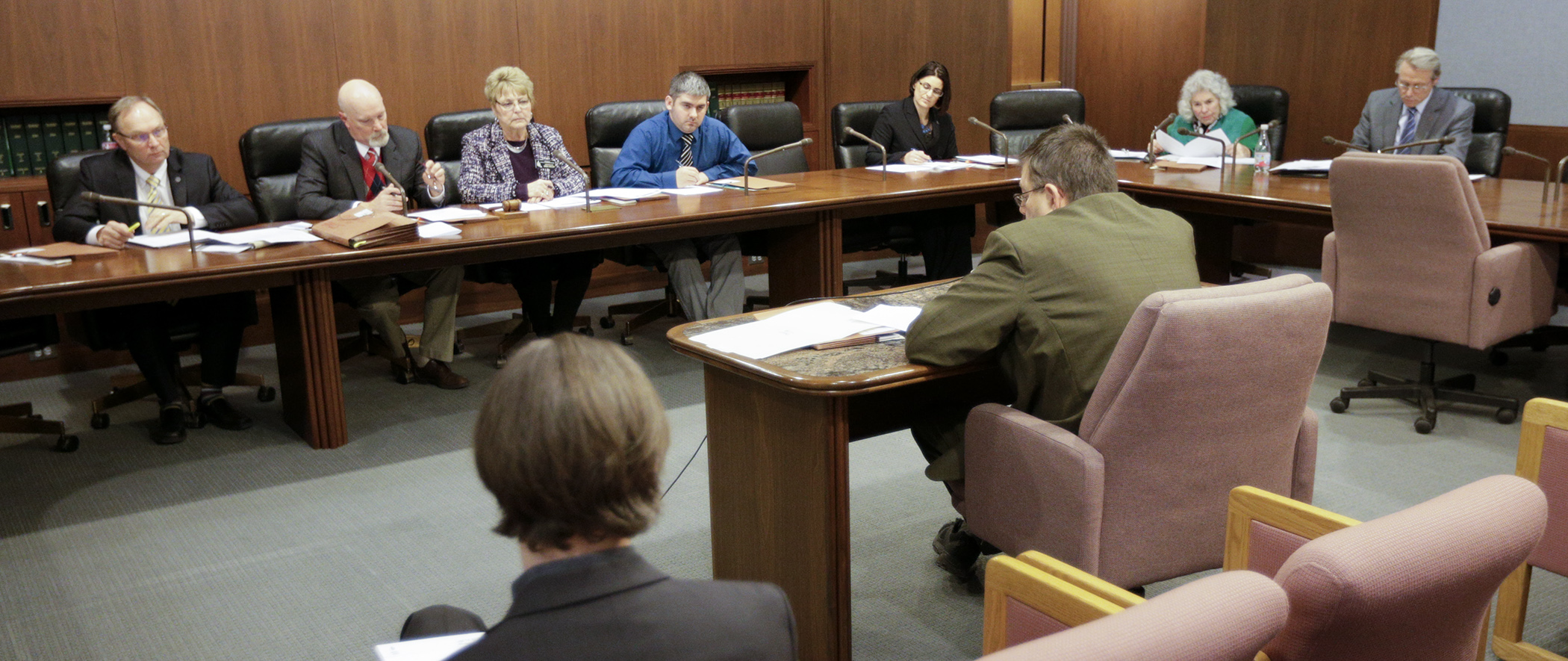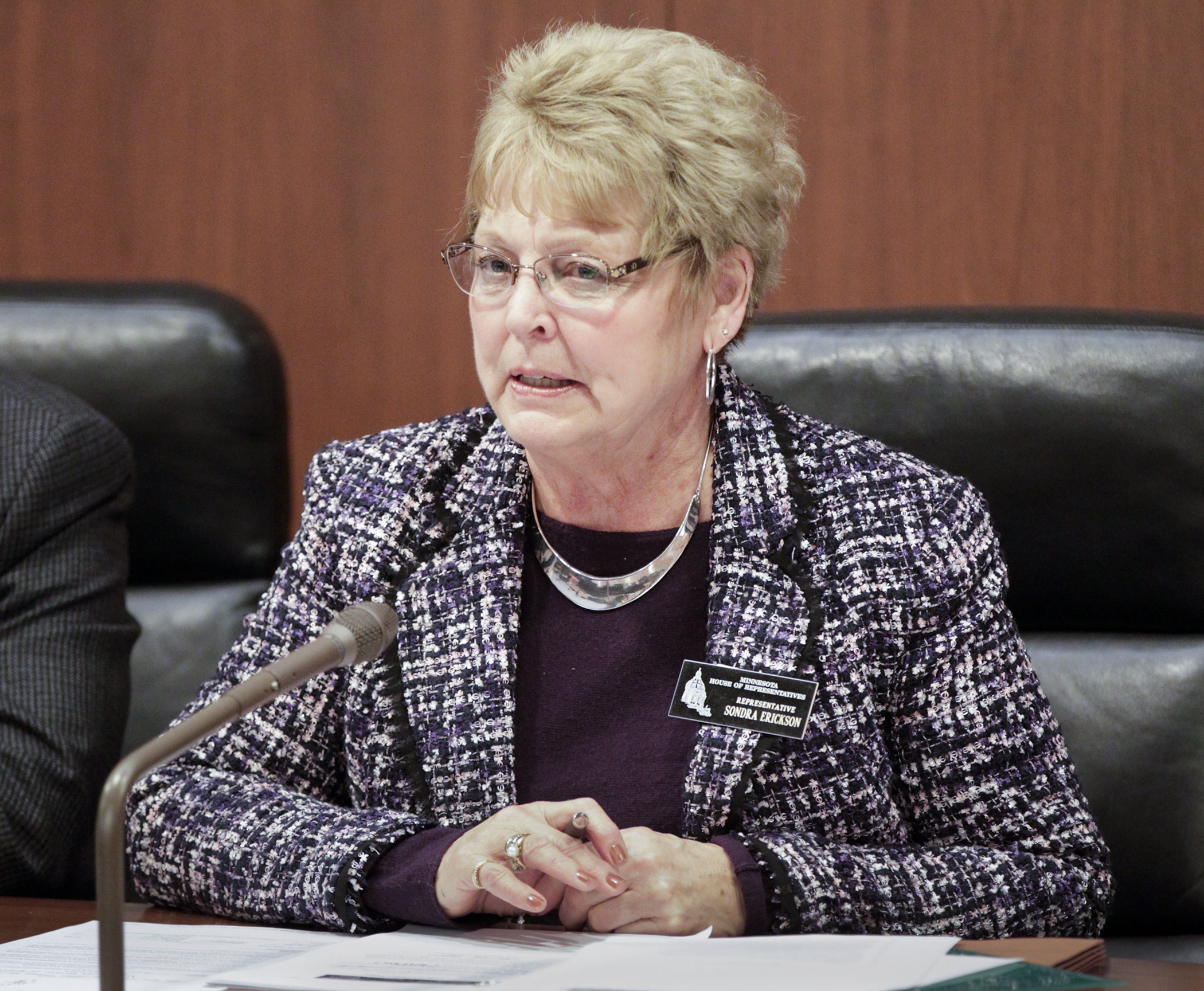House ethics panel stands at ready to self-police

Disputes over government ethics have been roiling politics around the globe this year, from Washington, D.C. to the protester-packed streets of Romania and South Korea.
Things are quieter in Minnesota, at least as far as the House committee charged with self-policing of members goes.
The House Ethics Committee met Jan. 30 to organize itself for the 2017-18 biennium. Barring a hearing into an official complaint against a legislator, it may not meet again until 2019. Across the street, the Senate has its own Subcommittee on Ethical Conduct. Neither panel has heard a case since 2015.
Serving on the House Ethics Committee can be an easy ride – or, if complaints come down just as legislative activity heats up, it can be “like eating broken glass or getting a root canal,” said Rep. Greg Davids (R-Preston), who called it “a very tough job.”
So life on the sometimes-sleepy ethics committee can get dramatic? “Traumatic,” said Rep. Mary Murphy (DFL-Hermantown). “Very worrisome.” Her service on the committee spans eight biennia, including two as chair.
The few, the proud
Despite a relatively low bar – House rules require that a minimum of two members sign a complaint – the House Ethics Committee has had reason to meet only infrequently. There have been hearings in as few as nine cases over the last 30 years, according to a list maintained by the Legislative Reference Library.
Rep. Sondra Erickson (R-Princeton) said she feels honored to chair the House Ethics Committee. Over her 10 years as a committee member, nine as chair, the panel has officially heard only three complaints.
“It speaks well of us,” Erickson said. “We are an amazing unit, the House — put 134 persons in a room to debate and discuss issues that can be very controversial.”
The committee workload in a given session is luck of the draw.
In the eight years Davids served between 1995-2004, the panel heard six complaints. Two cases involved former Rep. Arlon Lindner.
MORE Cases sent before the House Ethics Committee 1986-2016 (as compiled by the Minnesota Legislative Reference Library
“Any complaint is too many complaints,” Davids said. “It’s very difficult, sitting in judgment of your peers. … These are people’s lives you’re talking about.”
How it works
Complaints first go to the House Speaker who then forwards them to the committee. A probable-cause hearing is held unless the complaint is withdrawn or the committee finds it frivolous.
The committee consists of two DFLers and two Republicans, with one alternate from each party.
 Rep. Sondra Erickson, chair of the House Ethics Committee, comments during the committee’s organizational meeting Jan. 30. Photo by Paul Battaglia
Rep. Sondra Erickson, chair of the House Ethics Committee, comments during the committee’s organizational meeting Jan. 30. Photo by Paul BattagliaIf that setup seems tailor-made for 2-2 ties, Davids contends that partisanship must be left at the hearing room door. “The key is to never let your political side take part in the process,” he said.
In cases where the committee finds probable cause, an investigation can follow as well as another committee meeting when members may make a recommendation to the full House. On the House Floor, members may choose from a wide range of options: from no action to mandated counseling to censure or expulsion.
Most matters don’t get that far. Some are withdrawn, found frivolous, or die with a committee stalemate. Disputes that could lead to formal complaints are regularly defused. “Members resolve differences in all kinds of ways,” Erickson said, from quiet in-person advice to “tone it down” texts from leadership during debates. She has spoken to the full House on at least two occasions to urge colleagues to calm rhetoric that turns personal.
A simple, respectful approach, from a peer or by the committee, can change behavior. “’You’ve got to go and get help,’ sometimes works,” Murphy said.
Constitution, Rules, Code
Ethics rules in the House descend from Article IV, Section 7 of the Minnesota Constitution, which says: “Each house may determine the rules of its proceedings, sit upon its own adjournment, punish its members for disorderly behavior, and with the concurrence of two-thirds expel a member; but no member shall be expelled a second time for the same offense.”
“Disorderly behavior” isn’t precisely defined; complained-about behavior has ranged from criminal acts to vocal intimidation. But House Rules fill in other details: mainly House Rule 6.10, which lays out the committee’s makeup, responsibilities and process.
Two other House Rules pertain to the committee’s work. Rule 2.42 gives the committee the job of investigating complaints filed against lobbyists. Rule 9.01 provides for a code of conduct for House members and staff. Complaints about staff members are handled administratively.
A Code of Conduct is adopted every two years by the House rules committee. Erickson keeps a copy in her desk on the House Floor, just as she did while teaching in a classroom.
“You open the drawer, it’s right there,” she said. “I take it seriously.”
Like other committees and divisions, the House Ethics Committee adopts rules for itself each biennium. There are no changes for this biennium.
That was despite prompting from Erickson, who in an email and on the House Floor, asked fellow House members whether the social media era necessitates new rules.
The silence in response was deafening – Erickson heard back from no one. At the committee meeting, several members explained their preference for sticking with the Code of Conduct as is. Rep. Raymond Dehn (DFL-Mpls), a committee alternate, noted that the code doesn’t specifically call out other types of communication, such as newspapers or TV.
“Even with social media being used so widely, that’s part of our conduct,” Murphy said. “The generalness of our code and our policy is a positive thing for us.”
A different dispute
Another part of the Minnesota Constitution was invoked recently in a dispute touching on member behavior.
During an April 3 Floor debate, House Minority Leader Melissa Hortman (DFL-Brooklyn Park) asked for a call of the House, which would require members to be in the House Chamber until the call is lifted. She added, “I hate to break up the 100 percent white male card game in the Retiring Room, but I think this is an important debate.”
Those words led to a protest and dissent, as provided for in Article IV, Section 11 of the Minnesota Constitution, being published in the April 7 House Journal, signed by nearly 50 House Republicans. It says Hortman “needlessly invoked the race and gender of her colleagues, and called into question the motives of members during a lengthy floor debate.” It went on to say the members who signed it “admonish” Hortman and “implore” her to “apologize for her actions and strive to repair the damage she has caused to the collaborative work environment at the Minnesota House of Representatives.” Hortman, in an April 7 statement, said, “I’m still not sorry” and pledged to respond formally to the protest and dissent when the House reconvenes April 18.
But a protest and dissent does not trigger House Ethics Committee action. That still requires two members to file a formal ethics complaint.
Short history as standing committee
Considering the grand scope of legislative history, the current process has been in place a relatively short time. The House established a select committee on ethics in 1986, followed in 1989 by creation of the current standing committee. A Special Task Force to Revamp House Ethics in 1996 led to the current rules that make most of the committee’s meetings and records public.
Before the standing committee, a panel to hear ethics complaints was formed ad hoc to hear cases that didn’t go straight to the House Floor. But that left the process open to criticism that committee members could be handpicked to help or hinder the course of a particular complaint.
Such a system wouldn’t fly today.
Erickson said in early years, with a House full of farmers and lawyers who got together for a short span of days every two years, she suspects an easier camaraderie smoothed over many spats.
Now, with wide partisan divides, the needs of healing the House demand special qualities from those who serve on its ethics committee. Traits expressed by members include: fairness, objectivity and respect for fellow representatives and the institution.
Still, Murphy said, some Minnesotans give the ethics committee members a little too much credit.
Her office often hears from constituents and others who apparently think the House Ethics Committee deals with ethics in general, or maybe an ethical problem in their town.
She has to break it to them: “We don’t deal with that kind of ethics.”
More resources
You can learn more about the work of the House Ethics Committee and related matters from the Legislative Reference Library, and in nonpartisan House Research Department publications titled “Legislative Ethics” and “Ethics and the Minnesota House.”
Related Articles
Search Session Daily
Advanced Search OptionsPriority Dailies
Legislative leaders set 2026 committee deadlines
By Lisa Kaczke Legislative leaders on Tuesday officially set the timeline for getting bills through the committee process during the upcoming 2026 session.
Here are the three deadlines for...
Legislative leaders on Tuesday officially set the timeline for getting bills through the committee process during the upcoming 2026 session.
Here are the three deadlines for...
Latest budget forecast projects nearly $2.5 billion surplus, but red ink down the road
By Mike Cook Three weeks before Christmas, state budget officials provided some merriment to Minnesotans. However, Grinch-like transformations lurk.
Released Thursday, the November ...
Three weeks before Christmas, state budget officials provided some merriment to Minnesotans. However, Grinch-like transformations lurk.
Released Thursday, the November ...